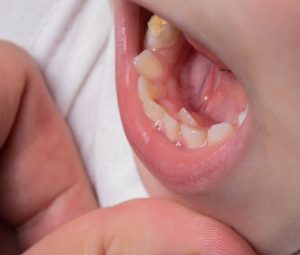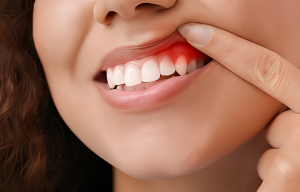Table of content
Gingivitis in children, while common, can significantly impact their daily lives and potentially lead to permanent damage to their teeth if left untreated. To protect your child’s oral health, let’s explore the causes, symptoms, and treatment options for gingivitis with Elite Dental in this comprehensive guide.
1. What is gingivitis in children?
Gingivitis refers to an infection of the gums surrounding the teeth, while other periodontal structures such as the alveolar bone, periodontal ligament, and cementum remain unaffected.
This condition can be categorized into two stages:
1.1 Early Stage
At this stage, the gums appear swollen, red, and bleed easily, especially during brushing. However, if detected early and treated properly, gingivitis can be reversed quickly and effectively.
1.2 Advanced Stage
In this stage, the child’s gums become severely inflamed, red, swollen, and painful, with noticeable bleeding and bad breath. If plaque is not removed, gingivitis can progress to more severe complications, such as tooth decay, pulpitis, or periapical inflammation.

2. Causes of gingivitis in children
Gingivitis in children can result from various factors, including
2.1 Poor Oral Hygiene
This is the leading cause of gingivitis. Inadequate oral hygiene allows bacteria and food debris to accumulate, forming plaque over time. Plaque contains harmful bacteria that release toxins, irritating and damaging the gums around the teeth.
2.2 Teething
Gum inflammation during teething is a temporary condition, often seen when children develop their first teeth around six months of age. The pressure exerted by erupting teeth on the gums can cause redness and swelling.
2.3 Physical trauma
Children’s gum tissues are soft and easily injured. Chewing hard foods, biting nails, or other physical impacts can irritate the gums, leading to redness, swelling, and discomfort.
2.4 Herpes infection
In children aged 2–5 years, acute oral infections caused by the herpes virus can lead to gingivitis. After an incubation period of about a week, the child may develop blisters on the cheeks, tongue, and gums, causing painful ulcers, difficulty swallowing, and poor appetite.
3. Symptoms of gingivitis in children
Common signs of gingivitis in children include:
- Swollen gums that bleed easily during brushing.
- Gums that appear pale or dark in color, lacking a healthy pink tone.
- Unusual white patches or spots on the gums.
- Bad breath caused by pus from swollen gums.
- Ulcers or sores inside the mouth and on the gums.
- Swollen gum margins, which may lead to gum recession and loose teeth.
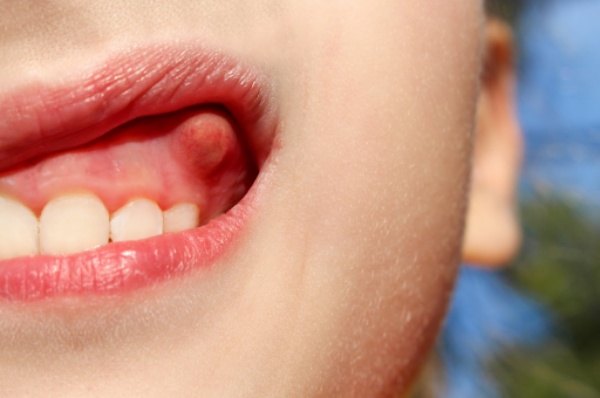
4. Consequences of untreated gingivitis in children
If left untreated, gingivitis can cause persistent gum pain, making it difficult for children to maintain proper oral hygiene or enjoy meals, which can negatively impact their overall health. Additionally, gingivitis can weaken tooth enamel, leading to discoloration and increased susceptibility to cavities.
In severe cases, gingivitis with pus can cause bad breath, which may affect a child’s confidence and social interactions. Therefore, parents should seek professional dental care promptly if their child shows symptoms of gingivitis.
5. Effective and safe treatment for gingivitis in children
Several methods can be used to treat gingivitis in children, depending on the severity of the condition:
5.1 Plaque and tartar removal
Removing plaque and tartar is essential to eliminate harmful bacteria on the gums and tooth surfaces. During this procedure, dentists may use laser technology to clean the tooth roots, preventing further plaque buildup and bacterial growth.
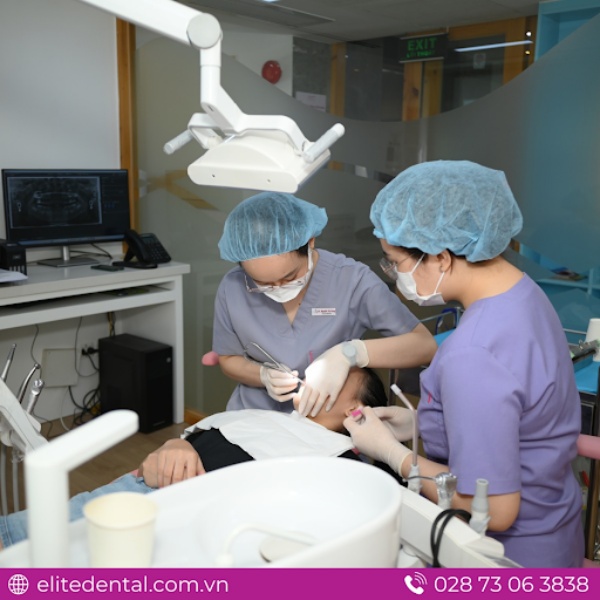
5.2 Antibiotic treatment
For cases of gingivitis with pus and gum bleeding, dentists may prescribe antibiotics alongside plaque removal to eliminate bacteria and prevent the infection from spreading.
5.3 Home remedies for mild gingivitis
For mild gingivitis, parents can help their child rinse with salt water twice a day. Saltwater helps reduce bacterial infection, soothe irritated gums, and promote healing.
While mild gingivitis can improve with these methods, the condition may recur if proper oral hygiene is not maintained. Parents should not take this issue lightly and should consult experienced dentists at reputable clinics for a thorough diagnosis and effective treatment plan.
Treating Gum Inflammation in Children at Elite Dental – Rest Assured with Skilled Doctors and Gentle Treatment
Founded in 2012, Elite Dental proudly stands as a trusted dental center not only for maintaining healthy and beautiful smiles but also as a reputable place for treating dental diseases.
When bringing children to Elite Dental for gum inflammation treatment, parents can be completely assured, as the clinic boasts a team of experienced general dentists who will thoroughly examine the child. Based on the child’s oral health, the severity of the condition, and the child’s age, the doctor will recommend the most optimal treatment. The doctors are particularly understanding of the child’s psychology, engaging in conversation to help the child cooperate and gently explain the importance of dental care, preventing recurrence of gum inflammation caused by oral health issues.
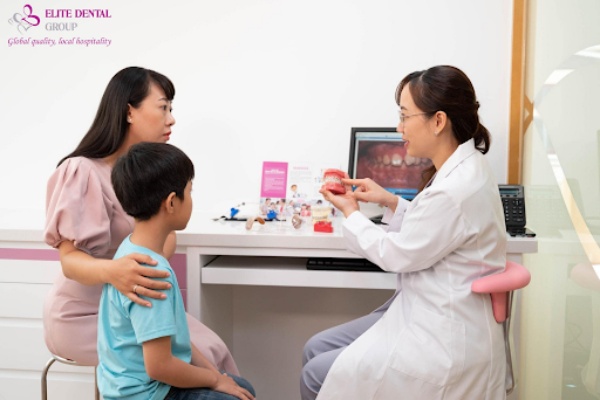
Furthermore, Elite Dental operates with an all-in-one model, providing all diagnostic and treatment services in one clinic without the need to travel to multiple locations, offering maximum convenience for parents. Additionally, the clinic applies strict sterilization procedures following European standards, ensuring a sterile and safe treatment environment for children. There is also a dedicated play area with bright colors and fun activities, including physical play and reading, allowing children to relax and feel ready for treatment.
Moreover, Elite Dental regularly updates dental information for children, helping parents monitor and guide their children to maintain proper oral hygiene at home. To schedule an appointment for gum inflammation treatment for your child, parents can contact Elite Dental via the hotline 0902 661 100 or 0902 559 888!
6. Prevention tips from elite dental
To prevent gingivitis in children, parents should follow these tips:
- Ensure your child brushes their teeth at least twice a day, especially after meals and before bedtime, to remove plaque and bacteria.
- Teach your child to use dental floss to clean between teeth and prevent plaque buildup.
- Limit sugary foods and beverages, which contribute to plaque formation, and encourage a diet rich in vegetables and fruits high in vitamin C to promote gum health.
- Keep items that your child frequently puts in their mouth clean to reduce bacterial exposure.
- Schedule regular dental checkups every six months to detect and address oral health issues early.
7. Frequently asked questions
7.1 How long does gingivitis in children take to heal?
Mild gingivitis in children can heal within 5–7 days with proper care and treatment as directed by a dentist. However, more severe cases caused by infections like herpes may take weeks or even months to recover.
7.2 What medications can treat gingivitis in children?
Antibiotics and anti-inflammatory medications may be prescribed to treat gingivitis caused by bacterial infections. Parents should never administer medication without consulting a dentist to ensure the correct dosage and treatment plan for their child’s condition.
7.3 What should children eat when they have gingivitis?
A nutritious diet can support the immune system and promote gum healing. Recommended foods include fiber-rich vegetables, salmon or other fatty fish, bone broth, chicken, broccoli, and green tea. Avoid hard, spicy, or sugary foods that can worsen gum irritation.

7.4 Is gingivitis with pus dangerous for children?
Untreated gingivitis with pus can lead to serious complications, such as periodontal disease, tooth loss, airway obstruction, or severe oral ulcers. Early detection and treatment are crucial to protect your child’s oral health.
The above information provides a comprehensive overview of gingivitis in children, helping parents understand its causes, symptoms, and treatment options. Regularly monitor your child’s oral health, and seek professional dental care promptly if any abnormalities arise. Contact Elite Dental for expert advice and effective treatment plans. Call our hotline at 028 7306 3838 to book an appointment, and let our experienced team help protect your child’s healthy smile!

